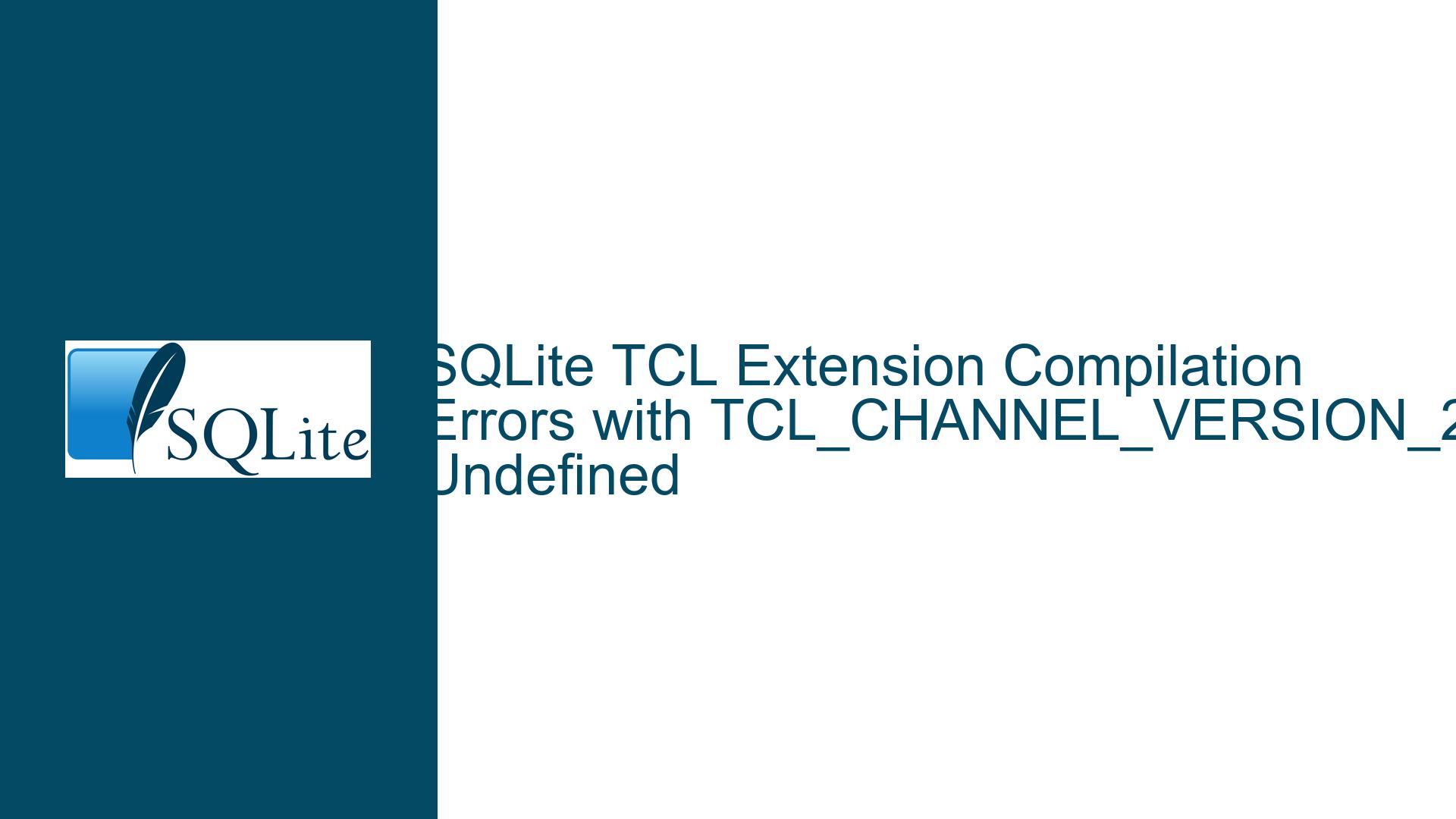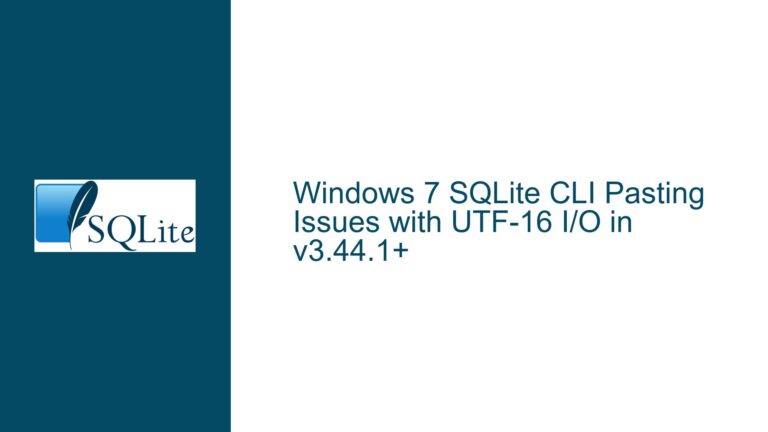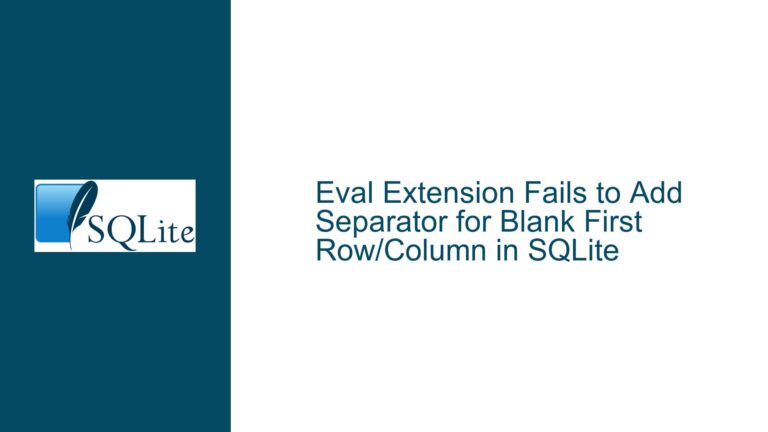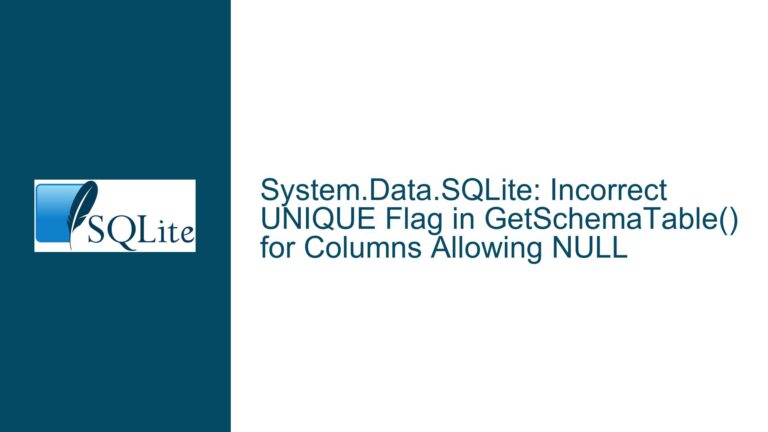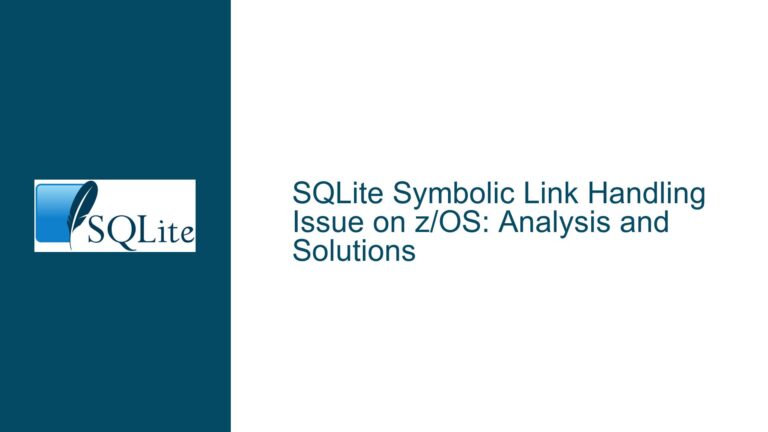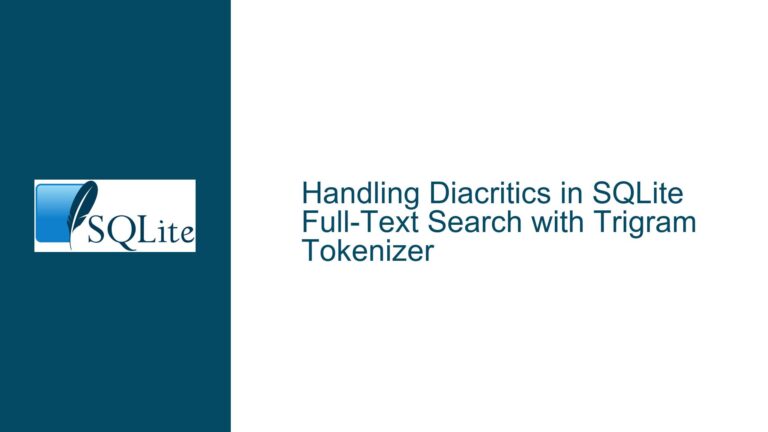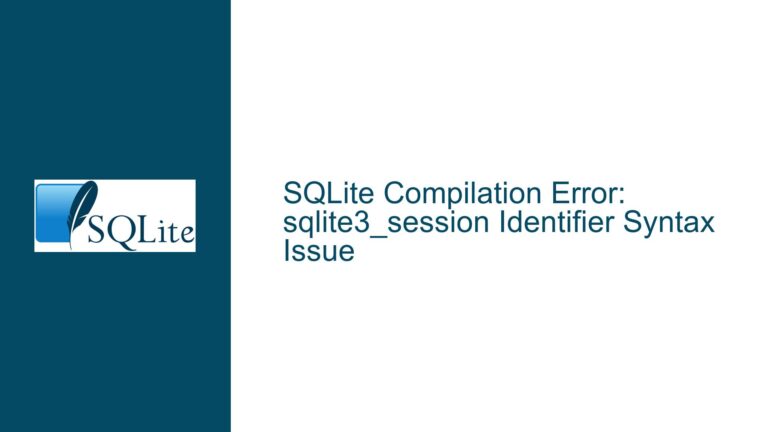SQLite TCL Extension Compilation Errors with TCL_CHANNEL_VERSION_2 Undefined
SQLite TCL Extension Compilation Errors Due to Missing TCL_CHANNEL_VERSION_2
When attempting to compile the SQLite TCL extension using the TEA (Tcl Extension Architecture) framework, users may encounter a compilation error related to the undefined identifier TCL_CHANNEL_VERSION_2. This error typically arises during the make process after configuring the SQLite source code with TCL support. The error message indicates that the TCL_CHANNEL_VERSION_2 macro, which is expected to be defined in the TCL headers, is missing or has been removed in newer versions of TCL. This issue is particularly prevalent when using TCL 9.0 or later, as the TCL_CHANNEL_VERSION_2 definition was deprecated or removed in favor of newer channel interfaces.
The error message is explicit:
./generic/tclsqlite3.c:376:3: error: use of undeclared identifier 'TCL_CHANNEL_VERSION_2'
TCL_CHANNEL_VERSION_2, /* version */
^
1 error generated.
make: *** [Makefile:289: tclsqlite3.o] Error 1
This error halts the compilation process, preventing the successful build of the SQLite TCL extension. The root cause lies in the incompatibility between the SQLite TCL extension code and the TCL library version being used. The SQLite TCL extension code references TCL_CHANNEL_VERSION_2, which is no longer available in the TCL headers, leading to the compilation failure.
Incompatibility Between SQLite TCL Extension and TCL Library Versions
The primary cause of the TCL_CHANNEL_VERSION_2 compilation error is the incompatibility between the SQLite TCL extension code and the version of the TCL library being used. The SQLite TCL extension was written to work with older versions of TCL, where TCL_CHANNEL_VERSION_2 was a defined macro in the TCL headers. However, in TCL 9.0 and later, this macro has been removed or deprecated, as the TCL development team has moved to newer channel interfaces.
The TCL_CHANNEL_VERSION_2 macro was part of the TCL channel API, which provides a mechanism for handling I/O operations in TCL. The channel API has evolved over time, and with the release of TCL 9.0, the TCL_CHANNEL_VERSION_2 macro was removed, as it was associated with an older version of the channel API. The SQLite TCL extension code, however, still references this macro, assuming its presence in the TCL headers. This assumption is no longer valid when using TCL 9.0 or later, leading to the compilation error.
Another contributing factor is the use of the TEA framework for building the SQLite TCL extension. The TEA framework provides a standardized way to build TCL extensions, but it relies on the correct configuration of the TCL library and headers. If the TCL library version being used is not compatible with the SQLite TCL extension code, the TEA framework will not be able to resolve the missing TCL_CHANNEL_VERSION_2 macro, resulting in the compilation error.
Resolving TCL_CHANNEL_VERSION_2 Compilation Errors with SQLite TCL Extension
To resolve the TCL_CHANNEL_VERSION_2 compilation error, several approaches can be taken, depending on the specific requirements and constraints of the project. The following steps outline the most effective solutions:
1. Downgrade TCL to a Compatible Version
One of the simplest solutions is to downgrade the TCL library to a version that still includes the TCL_CHANNEL_VERSION_2 macro. This approach is particularly useful if the project does not require the latest features of TCL 9.0 or later. By using an older version of TCL, such as TCL 8.6, the TCL_CHANNEL_VERSION_2 macro will be available, allowing the SQLite TCL extension to compile successfully.
To downgrade TCL, follow these steps:
Uninstall the Current TCL Version: Remove the existing TCL installation to avoid conflicts with the older version. This can typically be done using the package manager or by manually deleting the TCL installation directory.
Download and Install TCL 8.6: Obtain the source code or precompiled binaries for TCL 8.6 from the official TCL website or a trusted repository. Follow the installation instructions provided with the TCL 8.6 distribution.
Reconfigure the SQLite TCL Extension: After installing TCL 8.6, reconfigure the SQLite TCL extension to use the older TCL version. This can be done by specifying the path to the TCL 8.6 headers and library during the configuration process:
./configure --prefix=/usr --with-tcl=/path/to/tcl8.6Rebuild the SQLite TCL Extension: Run
makeandmake installto rebuild and install the SQLite TCL extension with the older TCL version.
2. Modify the SQLite TCL Extension Code
If downgrading TCL is not an option, the SQLite TCL extension code can be modified to remove or replace the references to TCL_CHANNEL_VERSION_2. This approach requires a deeper understanding of the TCL channel API and the SQLite TCL extension code, but it allows the extension to be compiled with newer versions of TCL.
To modify the SQLite TCL extension code, follow these steps:
Locate the References to
TCL_CHANNEL_VERSION_2: Open thetclsqlite3.cfile in a text editor and search for all instances ofTCL_CHANNEL_VERSION_2. These references are typically found in the channel initialization code.Replace
TCL_CHANNEL_VERSION_2with a Compatible Value: Depending on the TCL version being used, replaceTCL_CHANNEL_VERSION_2with a compatible value or macro. For example, if using TCL 9.0, theTCL_CHANNEL_VERSION_3macro may be available. Alternatively, the value can be hardcoded if the exact version is known.Rebuild the SQLite TCL Extension: After modifying the code, reconfigure and rebuild the SQLite TCL extension using the same steps as before:
./configure --prefix=/usr --with-tcl=/usr/local/lib make make install
3. Use a Patched Version of the SQLite TCL Extension
If modifying the SQLite TCL extension code is not feasible, a patched version of the extension can be used. Some developers and communities have already addressed the TCL_CHANNEL_VERSION_2 issue by providing patched versions of the SQLite TCL extension that are compatible with newer versions of TCL.
To use a patched version of the SQLite TCL extension, follow these steps:
Obtain the Patched Source Code: Search for a patched version of the SQLite TCL extension that is compatible with the TCL version being used. This can typically be found on developer forums, GitHub repositories, or other open-source platforms.
Replace the Original Source Code: Replace the original
tclsqlite3.cfile with the patched version. Ensure that all other files in the SQLite TCL extension directory are compatible with the patched code.Rebuild the SQLite TCL Extension: Reconfigure and rebuild the SQLite TCL extension using the patched source code:
./configure --prefix=/usr --with-tcl=/usr/local/lib make make install
4. Use an Alternative TCL Extension Mechanism
If the above solutions are not viable, an alternative approach is to use a different mechanism for integrating SQLite with TCL. This could involve using a different TCL extension that does not rely on the deprecated TCL_CHANNEL_VERSION_2 macro or using a different database library that is compatible with the current version of TCL.
To explore alternative TCL extension mechanisms, consider the following options:
Use a Different SQLite TCL Extension: Some third-party SQLite TCL extensions may already be compatible with newer versions of TCL. These extensions can be found on developer forums, GitHub repositories, or other open-source platforms.
Use a Different Database Library: If the project requirements allow, consider using a different database library that is compatible with the current version of TCL. Some alternatives to SQLite include Berkeley DB, PostgreSQL, and MySQL.
Develop a Custom TCL Extension: If no suitable alternative is available, consider developing a custom TCL extension that integrates SQLite with TCL without relying on the deprecated
TCL_CHANNEL_VERSION_2macro. This approach requires advanced knowledge of both TCL and SQLite, but it provides the most flexibility and control over the integration.
Conclusion
The TCL_CHANNEL_VERSION_2 compilation error is a common issue when attempting to compile the SQLite TCL extension with newer versions of TCL. The error arises due to the incompatibility between the SQLite TCL extension code and the TCL library version being used. By downgrading TCL, modifying the SQLite TCL extension code, using a patched version of the extension, or exploring alternative TCL extension mechanisms, this issue can be effectively resolved. Each solution has its own advantages and trade-offs, and the best approach depends on the specific requirements and constraints of the project.
